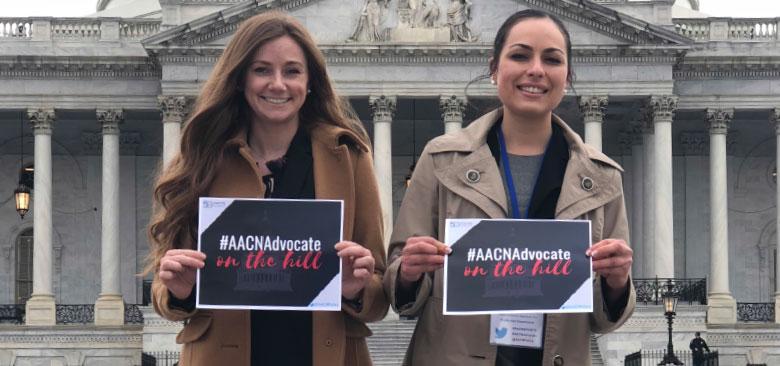
UCSF nurse practitioner students Katie Machado (left) and Ana Rothhammer-Ruiz attend the American Association of Colleges of Nursing Student Policy Summit.
From the Bedside to Capitol Hill: Learning to Leverage Our Voices
In March 2019, nurses from UCSF School of Nursing master’s degree programs attended two events in Washington, DC, as part of their education in how to effectively advocate for their patients and their profession.
Below, the students report on their experiences.
The AACN Student Health Policy Summit
Nurses represent the largest proportion of the country’s health care workforce. As such, we have an opportunity and obligation to leverage our professional experience to influence health policies at community, state and federal levels. Our voices have never been more needed, because numerous policy proposals threaten our patients’ health care coverage and access.
That’s why we were excited to represent UCSF at the American Association of Colleges of Nursing (AACN)’s Student Policy Summit in March 2019. The three-day conference was extremely rewarding for those of us eager to expand our knowledge of the federal legislative process, professional advocacy and health care reform policies.
During the summit – which focused on empowering students to advocate for patients and the nursing workforce at the federal level – we networked with hundreds of undergraduate, master’s degree and doctoral degree students, as well as deans from more than 100 nursing schools across 37 states. Federal policy experts briefed us on health policy bills currently being introduced in Congress and discussed effective ways to advocate for nursing-specific legislation on Capitol Hill. Additionally, we met with inspirational nursing leaders in the legislative and executive branches of government, including freshman Rep. Lauren Underwood, D‑Ill., Chief Population Health Officer of the Center for Medicaid and CHIP Services Ellen-Marie Whelan and Acting Director of the National Institute of Nursing Research (NINR) Ann Cashion.
On the second day of the summit, we met with the offices of Sen. Kamala Harris, D‑Calif., and Rep. Barbara Lee, D‑Calif., to advocate for reauthorization of Title VIII Nursing Workforce Development Programs, as well as funding for the NINR. Title VIII supports the expansion and diversity of the nursing workforce to help address nursing shortages in the U.S., especially in rural and underserved areas. It also strives to support higher education through the preservation of student loan forgiveness programs, and through increasing loan borrowing limits for nursing students. We believe such programs are essential to meeting the health care needs of individuals and communities across the U.S., but the current administration has proposed cutting Title VIII funding by nearly 67 percent in 2020.
The summit provided us with an essential learning experience in how to become advocates for change, for which we are very thankful. We left inspired and ready to encourage our peers to also be advocates at local, state and federal levels.
Ana Rothhammer-Ruiz and Katie Machado
The Nurse in Washington Internship Program
 From left to right: UCSF students Ashley Moore, Lisa Isola and Rachel Mathison; RWJ Health Policy Fellow Ellen T. Kurtzman; UC Davis students Cherrie Demayo and Rachael Viale; and UCSF student Marina Forte. The Nursing Organizations Alliance (NOA)’s Nurse in Washington Internship (NIWI) program orients registered nurses to the federal legislative process and prepares nurses to lobby and advocate for nursing and health care issues in Congress.
From left to right: UCSF students Ashley Moore, Lisa Isola and Rachel Mathison; RWJ Health Policy Fellow Ellen T. Kurtzman; UC Davis students Cherrie Demayo and Rachael Viale; and UCSF student Marina Forte. The Nursing Organizations Alliance (NOA)’s Nurse in Washington Internship (NIWI) program orients registered nurses to the federal legislative process and prepares nurses to lobby and advocate for nursing and health care issues in Congress.
In March 2019, four students from the UCSF School of Nursing attended NIWI, and we found our time informative and empowering. We gained insights into the entire spectrum of advocacy, from making an appointment with members of Congress through synthesizing policy information into a concise message and ask for government representatives.
All of the nurses from California at NIWI also took turns presenting our pitch to support full funding of Title VIII Nursing Workforce Development Programs to the staffs of Rep. Tom McClintock, R‑Calif., Rep. Doris Matsui, D‑Calif., Sen. Kamala Harris, D‑Calif., Sen. Dianne Feinstein, D‑Calif., and Speaker Nancy Pelosi, D‑Calif.
We explained that since its implementation in 1967, Title VIII has been a cornerstone of nursing development, research and advanced practice education. It plays an important role in increasing the number of nurses working with rural and underserved populations, growing faculty for schools of nursing, expanding the diversity of the nursing workforce – and increasing the number of nurse practitioners, who are uniquely positioned to fill gaps in primary care provider shortages.
We also argued that nurses’ practical and professional perspectives make them ideally positioned to shape the future of health care in the U.S. Because they are everywhere – from public health nursing to hospital leadership, from bedsides to boardrooms and from basic research to quality improvement – it is imperative that nurses be part of shaping health care policy at all levels of government.
Our fellow attendees spanned first-year nursing students, recent graduates and retired nurses getting their first taste of health policy. One highlight was meeting Ellen T. Kurtzman, a Robert Wood Johnson Foundation (RWJF) health policy fellow who was representing Nancy Pelosi’s office. Seeing this accomplished nurse leader working for the speaker of the House of Representatives was an inspiration.
Marina Forte, Lisa Isola, Rachel Mathison and Ashley Moore
Ana Rothhammer-Ruiz is a student in the Family Nurse Practitioner program. Katie Machado is a student in the Pediatric Nurse Practitioner program. Marina Forte is a student in the Master’s Entry Program in Nursing, with a specialty in Occupational and Environmental Health Nursing. Lisa Isola, Rachel Mathison and Ashley Moore are students in the Health Policy program.


![From left to right: Lieutenant Emily Latimer, Denise Mercer, Program Coordinator Lynda Mackin, Lieutenant Commander Nancy Helfrich, Tomoko Takano, Christa Perryman and Sara Cohen. (Photo by Dionicio Layugan [USN, ret.].)](/sites/nursing.ucsf.edu/files/styles/square_100/public/2023-01/UCSF_Nursing_VA_Navy2.jpg?itok=KVt3AZmf)
